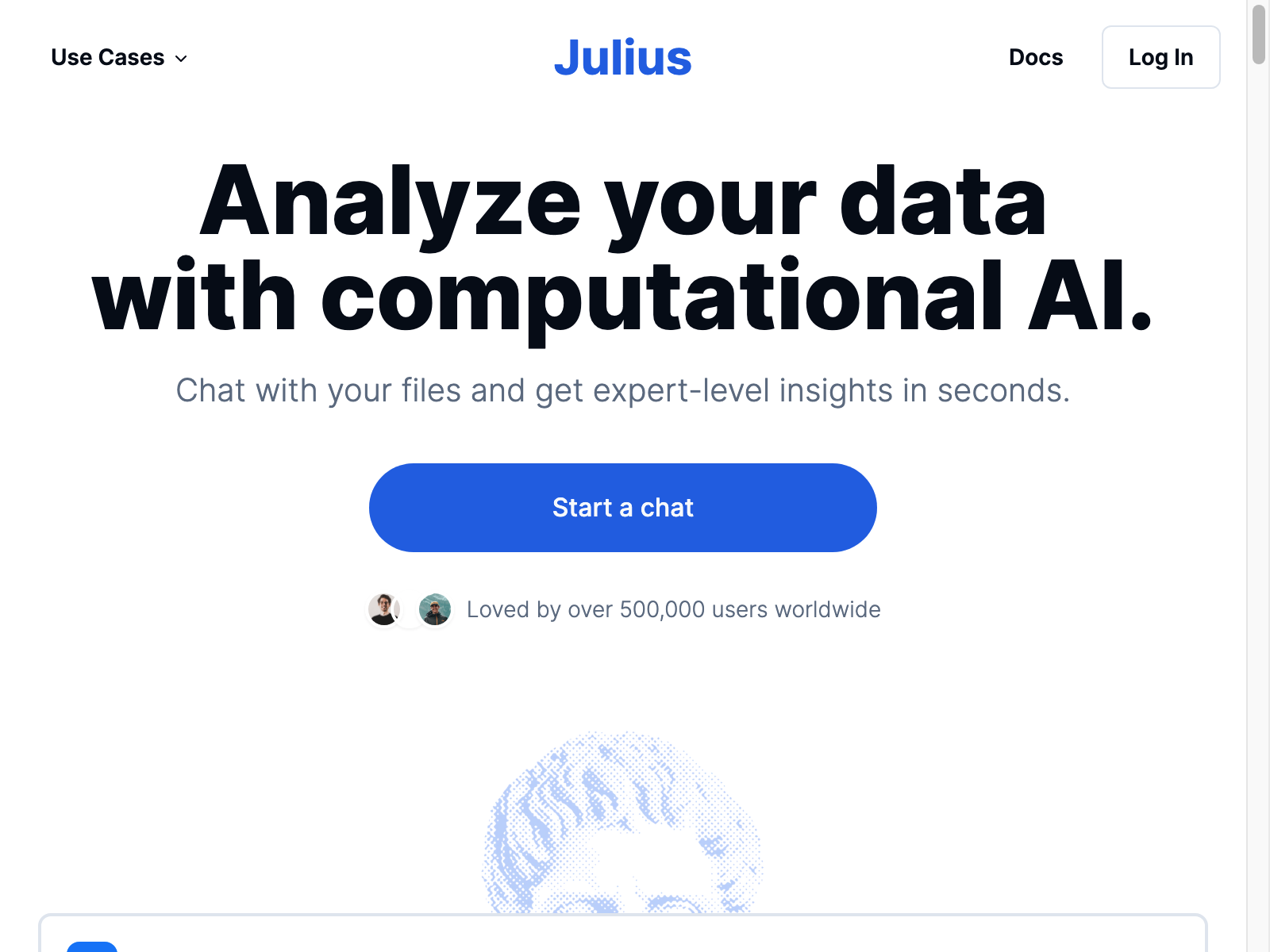Comprehensive Review of Julius AI: Your AI-Powered Data Analyst
Published on
Introduction
In today's data-driven business landscape, organizations are constantly seeking efficient and user-friendly tools to extract valuable insights from their vast troves of data. Enter Julius AI, a revolutionary AI-powered data analysis platform that is poised to transform the way businesses approach data analysis and decision-making.
Intuitive Interface and Natural Language Processing
One of the standout features of Julius AI is its highly intuitive and user-friendly interface. Designed with the non-technical user in mind, the platform leverages advanced natural language processing (NLP) capabilities to allow users to interact with their data using natural language queries. This eliminates the need for complex SQL or programming skills, making data analysis accessible to a wider audience within an organization.
Whether you're a seasoned data analyst or a business executive with limited technical expertise, Julius AI's NLP-driven interface enables you to simply ask questions about your data and receive insightful visualizations and analyses in response. This streamlined approach not only saves time and effort but also fosters a more collaborative and inclusive data-driven culture within the organization.
Automated Visualization and Dashboarding
Another key strength of Julius AI is its ability to automatically generate data visualizations and dashboards based on user queries. Gone are the days of manually creating charts and graphs – Julius AI's powerful algorithms can quickly identify the most relevant and impactful visualizations to represent your data, allowing you to focus on interpreting the insights rather than the mechanics of data visualization.
The platform's dashboard creation capabilities are particularly impressive, enabling users to build custom, interactive dashboards that provide a comprehensive view of their data. These dashboards can be easily shared and collaborated on, empowering teams to make data-driven decisions in real-time.
Advanced Forecasting and Predictive Modeling
One of the standout features of Julius AI is its advanced forecasting and predictive modeling capabilities. Leveraging the power of machine learning and AI, the platform can analyze historical data to generate accurate forecasts and predictive models, helping organizations anticipate future trends, identify potential risks, and make more informed strategic decisions.
Whether you're looking to forecast sales, predict customer churn, or optimize operational processes, Julius AI's forecasting and predictive modeling tools provide a robust and reliable solution. The platform's ability to seamlessly integrate with a wide range of data sources further enhances its predictive capabilities, ensuring that users have access to the most comprehensive and up-to-date data.
Seamless Data Integration and Centralization
One of the key challenges organizations face in the data analysis process is the fragmentation of data across multiple sources and systems. Julius AI addresses this issue by providing seamless integration with a wide range of data sources, including spreadsheets, databases, and cloud-based platforms.
By centralizing data within the Julius AI platform, users can access and analyze all their relevant data in a single, unified environment. This not only streamlines the data analysis workflow but also ensures that users are working with the most accurate and up-to-date information, reducing the risk of data silos and inconsistencies.
Collaborative Features for Team-Based Data Analysis
In today's business landscape, data analysis is often a collaborative effort, with teams of professionals working together to derive insights and drive decision-making. Julius AI recognizes this and has incorporated robust collaborative features into its platform, enabling users to work together in real-time, share insights, and collectively make sense of their data.
The platform's commenting and annotation tools, as well as its ability to manage user permissions and access rights, facilitate a seamless and secure collaborative experience. This collaborative approach not only enhances the quality of the insights generated but also fosters a culture of data-driven decision-making within the organization.
Customizable Reporting and Export Options
While the automated visualization and dashboard capabilities of Julius AI are impressive, the platform also offers a high degree of customization and flexibility when it comes to reporting and data export. Users can create custom reports, tailored to their specific needs and preferences, and export data in a variety of formats, including Excel, PDF, and CSV.
This level of customization ensures that users can seamlessly integrate Julius AI's insights and analyses into their existing workflows and reporting processes, further enhancing the platform's value and adoption within the organization.
Potential Drawbacks and Considerations
While Julius AI is a highly capable and versatile data analysis platform, it's important to consider a few potential drawbacks and areas of concern:
-
Learning Curve: For users unfamiliar with AI-powered data analysis tools, there may be a learning curve associated with Julius AI. The platform's advanced features and capabilities may require some initial training and familiarization to ensure users can fully leverage its potential.
-
Data Quality and Availability: The accuracy and reliability of Julius AI's insights are heavily dependent on the quality and availability of the data being analyzed. Organizations must ensure that their data is clean, comprehensive, and up-to-date to maximize the value of the platform's capabilities.
-
Privacy and Security Concerns: As with any data-centric platform, organizations must carefully consider the privacy and security implications of using Julius AI, particularly when dealing with sensitive or confidential information. Robust data governance and security measures should be in place to mitigate these concerns.
Pricing and Deployment Options
Julius AI offers a range of pricing plans to accommodate the needs of organizations of various sizes and budgets. The Starter plan, priced at $99 per month, provides a solid foundation for small to medium-sized businesses, while the Professional plan ($499 per month) and the Enterprise plan (custom pricing) cater to the more complex and demanding requirements of larger organizations.
In terms of deployment, Julius AI can be seamlessly integrated into an organization's existing technology stack, with options for on-premises, cloud-based, or hybrid implementations. This flexibility ensures that the platform can be tailored to the specific needs and infrastructure of each organization.
Conclusion
Julius AI is a game-changing AI-powered data analysis platform that has the potential to revolutionize the way organizations approach data-driven decision-making. With its intuitive interface, automated visualization and forecasting capabilities, and seamless data integration, Julius AI empowers users of all skill levels to extract valuable insights from their data and make more informed, strategic decisions.
While there are a few potential drawbacks to consider, such as the learning curve and data quality requirements, the overall benefits of Julius AI far outweigh these concerns. As organizations continue to navigate the data-driven landscape, tools like Julius AI will become increasingly essential in driving innovation, improving operational efficiency, and gaining a competitive edge in the market.

